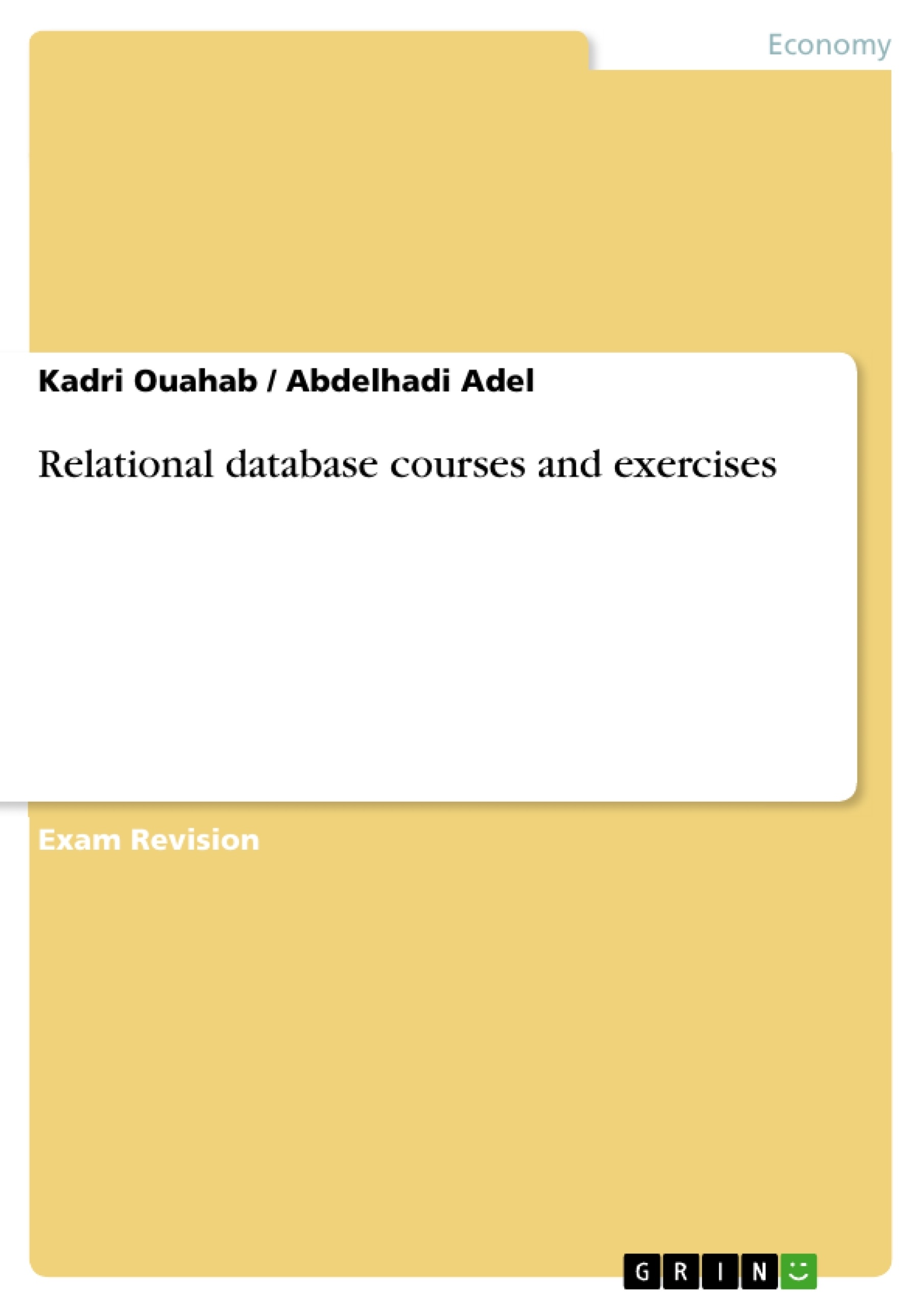This course is intended for computing sophomores and aims at presenting basic principles of relational DBMS and the practice of these fundamentals. The course content is mainly the following:
Chapter 1: Introduction to databases
Chapter 2: Relational Model
Chapter 3: Relational Algebra
Chapter 4: Standardization
Chapter 5: SQL Language
Chapter 6: Practical work
A set of exercises are included at the end of the document. We added a tutorial section and directed to allow students to apply the concepts learned in the five chapters.
Inhaltsverzeichnis (Table of Contents)
- Introduction
- 1.1. Database
- 1.1.1. Definition
- 1.1.2. The description of a database.
- 1.1.2.1. Definitions
- 1.2. Database Management System
- 1.2.1. Definition
- 1.2.2. The aims and properties of these systems are manifold…
- 2.1. Introduction.
- 2.2. basic concepts
- 2.2.1. Attribute.
- 2.2.2. Field
- 2.2.3. Schematic relationship
- 2.2.4. Relationship
- 2.2.5. Degree
- 2.2.6. Occurrence
- 2.2.7. cardinality
- 2.2.8. candidate key.
- 2.2.9. primary key
- 2.2.10. foreign key
- 2.3. relational model
- 2.3.1. Translation of the conceptual model into relational model
- 2.3.1.1. Rules passages MC objects NCM Relations.
- 2.3.1.2. passing rules of associations MC NCM Relations.
- 2.3.1. Translation of the conceptual model into relational model
- 3.1. The basic operations.
- 3.2. Expression of the relational algebra.
- 4.1. functional dependence
- 4.1.1. Introduction
- 4.1.2. Definition
- 4.1.3. Graphical representation of functional dependencies
- 4.1.4. Properties (Armstrong axioms)
- 4.1.5. elementary functional dependence
- 4.1.6. direct functional dependence
- 4.2. The transitive closure
- 4.3. The minimum coverage.
- 4.4. Closure of a set of attributes
- 4.4.1. Definition
- 4.4.2. A closure algorithm
- 4.5. Research Process key candidates
- 4.6. poor design
- 4.7. The decomposition
- 4.7.1. Definition
- 4.7.2. Decomposition Lossless Information.
- 4.7.3. Decomposition without loss of DF.
- 4.8. Why normalize?
- 4.8.1 First Normal Form
- 4.8.2. Second Normal Form
- 4.8.3. Third Normal Form.
- 4.8.4. normal form Boyce-Codd
- 4.9 Decomposition into 3NF.
- 4.10. valid decomposition BCNF.
- 4.11.1. Formalism of the algorithm:
- 4.11.2. Sample Application
- 4.11. Decomposition without loss of information: Ullman algorithm
- 5.1. Basic Structure
- Select clause
- 5.1.3. Where clause
- 5.1.4. The From clause.
- 5.1.5. The variables tuples
- 5.1.6. The Order by clause
- 5.1.7 set operators
- 5.2. The aggregate functions
- 5.2.1 aggregates and group by
- 5.2.2. Aggregates and the having clause.
- 5.2.3. nested queries
- 5.2.4. The views.
- 5.2.5. Changing relationships.
- 5.3. Sql as ldd.
- 5.3.1. Areas
- 5.3.2. Creating tables
- 5.3.3. Schema Manipulation
- 5.3.4. foreign key
- 5.3.5. outer join
- 5.3.6. Mechanism of Rights
- 5.3.7. The rights in sql.
- 5.3.8. Using Views
- TP 1: Creating the database.
- TP 2: Inserting data
- TP 3: Importing and exporting data
- TP 4: Selecting Data
- TP 5: Data Update.
- 3TP 6: Data Deletion.
- TP 7: Relations between tables
- Exercises
- Exercises Solutions
Zielsetzung und Themenschwerpunkte (Objectives and Key Themes)
This course is designed for sophomore computer science students and aims to introduce fundamental principles of relational database management systems (DBMS) and provide practical application of these concepts. The course covers a wide range of topics including database definitions, relational modeling, relational algebra, database standardization, and the SQL language.
- Introduction to databases and database management systems.
- Relational database concepts including attributes, relationships, and keys.
- Relational algebra and its operations.
- Database standardization and normalization techniques.
- The SQL language for data manipulation and management.
Zusammenfassung der Kapitel (Chapter Summaries)
- Introduction: This introductory chapter provides an overview of the course's objectives and scope, highlighting the importance of relational DBMS in computer science.
- Chapter 1: Introduction to Databases: This chapter defines the concept of a database and explores its key features and components. It also examines the role and characteristics of database management systems.
- Chapter 2: Relational Model: This chapter delves into the relational database model, outlining the fundamental concepts of attributes, relationships, keys, and their significance in database design.
- Chapter 3: Relational Algebra: This chapter introduces the relational algebra, focusing on the basic operations and their application in manipulating and querying relational databases.
- Chapter 4: Standardization: This chapter covers database normalization techniques, focusing on the principles behind achieving optimal database structure and efficiency.
- Chapter 5: SQL Language: This chapter introduces the Structured Query Language (SQL), a widely used standard for database management, focusing on its syntax, features, and practical usage.
Schlüsselwörter (Keywords)
Relational Database Management System (DBMS), database design, relational model, attributes, relationships, keys, relational algebra, normalization, SQL, data manipulation, data management.
- Quote paper
- Dr. Kadri Ouahab (Author), Dr. Abdelhadi Adel (Author), 2017, Relational database courses and exercises, Munich, GRIN Verlag, https://www.grin.com/document/379548




